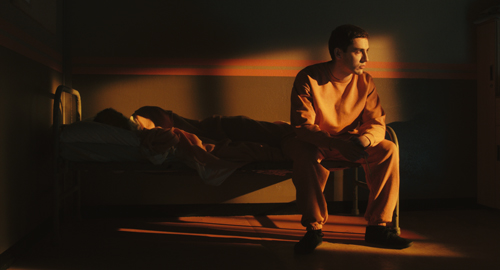New Perspectives screening - review - WE ARE MONSTER by Antony Petrou
 How do you get inside the mind of a monster? Well, this deep and intense psychological character study of evil uses the infamous and yet somehow forgotten case of Zahid Mubarek, an Asian teen brutally killed by his fellow inmate Robert Stewart.
How do you get inside the mind of a monster? Well, this deep and intense psychological character study of evil uses the infamous and yet somehow forgotten case of Zahid Mubarek, an Asian teen brutally killed by his fellow inmate Robert Stewart.
Stewart’s soul was corrupted by a tough upbringing mixed with abuse by parents and schoolmates alike. Having experienced a series of traumas, thus began a spiral into hatred, racism and violence. We meet him in We Are Monster having already committed the murder, standing still and looking at the lifeless bloodied corpse of his cellmate. After a long initial shot, we backtrack to his arrival to the institution and from there we witness an outrageous mixture of incompetence on the part of the guards and the further dereliction of Stewart’s own mind as he becomes more and more convinced of the murder of Zahid. “It’s their problem” is their unfortunate creed. Yet, it’s hard not to see a certain fear in stepping over the boundaries of order and thus leading the whole institution into chaos.
What adds to the anger an audience member may feel, is the well documented succession of warning signs that actually could have stopped the brutal event. Nevertheless, We Are Monster remains non judgemental. Leeshon Alexander, who wrote the screenplay and plays the character of Stewart, seeks to understand and really enter the mind of the criminal. To do so, he uses the gimmick of splitting his central figure into two, with him playing his evil and manipulative side. This is a technique that works thanks to Alexander’s own intensity in his portrayal of these two character that, as the film progresses, blend into one.
 At times, one may fear the film slipping into horror film territory. This is never allowed to happen, at least not in an exploitative sense. Part of the reason is that director Petrou allows his audience to engage in a meditative sense with a slow hypnotic pace minimal camera movement and warm lighting which creates a stark and haunting contrast with the darkness of Stewart’s soul and the claustrophobia of the prison setting.
At times, one may fear the film slipping into horror film territory. This is never allowed to happen, at least not in an exploitative sense. Part of the reason is that director Petrou allows his audience to engage in a meditative sense with a slow hypnotic pace minimal camera movement and warm lighting which creates a stark and haunting contrast with the darkness of Stewart’s soul and the claustrophobia of the prison setting.
If the film comes across as disturbing and haunting it is because it is so psychologically dense. It’s hard and downright uncomfortable to witness some of the scenes, hear some of the dialogue that alone portrays pure evil and even its details such as Stewart’s pathological need to scratch a scar on his hand can be unsettling. The truly haunting aspect of the film is that, if one thing is for certain, there is a disenchantment that follows this film – justice does not prevail. Despite the seriousness of this case, not much changed since and the guilty parties in this story stand unpunished.
